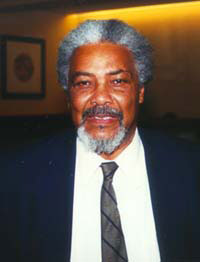Professor George C. Bond: The New William F. Russell Professor in the Foundations of Education
When President Levine announced to the full faculty that George C. Bond, Professor of Anthropology and Education, was awarded the William F. Russell Professorship in the Foundations of Education, Bond seemed almost distracted by the honor.
Bond explained that he was humbled by the announcement of the endowed chair and all the history that goes along with the honor. He says he credits the award of the Russell Chair not to his own individual achievement but to a historical collectivity.
"I would say that in a sense being a recipient of the Russell Chair has to do with my own personal history and the history of a collectivity," he said. "I'm a product of a set of historical circumstances and processes that have provided the conditions for individual achievement."
Education runs in Bond's family. His father, J. Max Bond, was the founder and President of the University of Liberia. His uncles, Horace Mann Bond and Rufus Early Clement, were scholars and presidents of black colleges in the United States.
"This meant I was raised in a family where one was exposed to high academic standards," Bond said. "There was a constant array of academics and intellectual activists from all over the world passing through our collective households."
Since his family had so many intellectual leaders, Bond was exposed to many different cultures and histories of people.
"In addition to academic standards, there were also moral covenants that one had with other peoples such as African intellectuals and nationalists and people of a Jewish background in our houses," he said. "There were also others, people who had experienced and understood oppression and knew what it was like to be disadvantaged. It was these intellectual and moral alliances that positioned me for my life's work as a teacher and scholar."
All this, Bond said, has led to his dedication to research that is dominated by inequality.
"My concern has always been with inequality and with the relation of different peoples to concepts and practices of equality," he explained.
Bond talked about his life in the South and how life in that part of the United States, when he became what he calls "socially aware" after the Second World War, helped formulate his later research.
"In the South there were two main populations that suffered the consequences of inequality-one was black and the other was Jewish," he said. "At the time we were part of an historical alliance, one that stemmed from the Niagara Movement of 1909 and was constructed prior to my birth. There was a progressive and intellectual interchange, at a sophisticated level, about the nature of knowledge itself and its relation to education and oppression."
The sense of a collective political alliance moved forward historically and created and provided the context for his interest in equality and oppression and the manner in which education could be used to achieve one and transform the other, he said. His main interest has been in social transformations.
Professor Bond's research is varied. For one, he looks at the transformation of agrarian societies and the building of intellectual elites through mission education.
Another aspect has been to look at the nature of elite formation amongst the black population and the building of an elite ethic related to scholarship, he said. Also, the domain has to do with ongoing, practical events, such as 'complex emergencies,' where social and physical disasters combine to produce population displacements.
"Kids are unable to receive appropriate schooling," he continued. "They enter refugee camps and their training is ad hoc and inadequate. There are many questions such as: When the crisis is over, what happens to them? How can they be reintegrated into society? What types of schools are required to provide them with the social and technical skills to rebuild the basic institutions of their societies?"
Bond said that managing a complex emergency requires the cooperation of places like Teachers College with major funding agencies, national governments and local organizations and peoples.
In doing research that was published on HIV/AIDS and its consequences, specifically in Central and Southern Africa, Bond found that the disease is devastating the skilled and professional sections of these regions.
"Many of my friends and colleagues have died from the disease," he said. "It is unfortunate that there is no research center at Teachers College, or, for that matter, at any school of education devoted to the social research and education on this topic as a central feature of a complex emergency."
Bond sees the Russell Chair as an opportunity to actively pursue his research topics in a practical way.
"I hope this honor will provide me with the opportunity to raise money to train students, especially those from minority and disadvantaged backgrounds," he said. "I would like to have a cadre of students who would take up different facets of research and bring their own theoretical insights. I want to give them the same opportunities for intellectual discovery and inquiry that I have had."
Published Monday, May. 20, 2002
